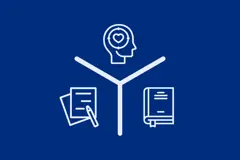These competencies demonstrate the values that motivate and sustain company secretaries and governance professionals and enable them to make distinctive contributions to their organisations and boards.
Values play a big part in attracting people to the profession and helping them to succeed within it. They can be developed through observation, experience, and practice, and reinforced through professional networks and peer learning.
The role of a company secretary or governance professional can be lonely at times, and a reliable network can prevent professional isolation and provide support, guidance, and inspiration, especially at times of significant change or crisis.
Like the 'understanding' competencies, what changes as people progress are the opportunities to apply values in their organisations and the wider environment, which evolve with seniority and experience. The development of professional values is not detrimental to existing personal, family, community, or national values.
The CGIUKI Code of Professional Ethics and Conduct
Many of these competencies and the behaviours that express them are described in the Code of Professional Ethics and Conduct.
Those who act ethically will show an understanding of:
-
the meaning of integrity: the quality of being honest and having strong moral principles
-
professional ethics: standards of conduct and values in respect of the organisation, the governance profession and all related activities
-
recognising and limiting bias: incorporating equality, diversity and inclusion
-
the identification and management of conflicts of interest: both one’s own and others’.
Those who act independently will show an understanding of:
-
when and how to take an independent stance in contrast with that of others
-
how to communicate and when to maintain and promote alternative opinions
-
when and how to challenge the status quo, including when it is not beneficial
-
when and in what context and environment discretion is required.
Those who are open-minded will show an understanding of:
-
how the promotion of alternative views and opinions generates a diversity of thinking and discussion to the benefit of the organisation
-
a learning culture for themself and the organisation, learning from successes and mistakes, encouraging continuous sharing of knowledge alongside formal and informal training
-
working flexibly within their role and in interactions with others to maintain focus on deliverables and a positive work environment
-
promoting governance as an enabler and collaborating with and embedding into the values and culture of an organisation as well as the values of the role holder
-
working pro-actively within teams of colleagues that benefit the organisation and deliver effective outcomes.
Those who act with emotional intelligence show an understanding of:
-
the application of alternative responses to reflect environments and situations demonstrating emotional self-awareness and self-control
-
their own and others’ biases and pre-conceptions and how to adapt situations and environments to limit their impact
-
how to show empathy, sensitivity and perceptiveness in a professional environment
-
building relationships with and working alongside colleagues, especially those with differing personalities, views, backgrounds, experiences and attitudes
-
the benefit of investing in their own learning to maintain and develop their contribution and effectiveness.



